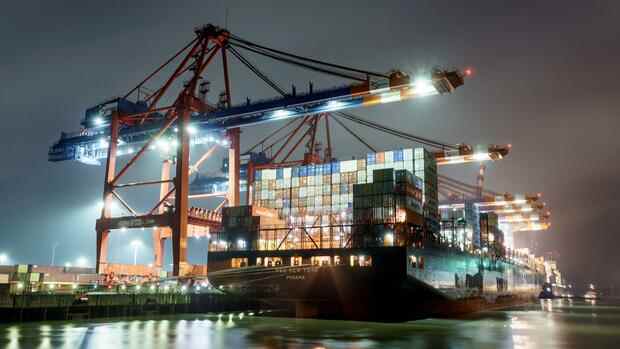The port on the Elbe is threatened with a loss of handling due to the war in Ukraine.
(Photo: dpa)
Dusseldorf The joy in the port of Hamburg was short-lived. Hamburg’s Economics Senator Michael Westhagemann (independent) enthused four weeks ago that the deepening of the Elbe, which had been discussed and repeatedly postponed for two decades, is finally complete. The approximately 130-kilometer section between Hamburg and the North Sea can now also be navigated by freighters with an additional 1.90 meter draft, which allows an additional load of 2,440 standard containers (TEU) per ship.
The hoped-for upswing of the largest German seaport has been in the stars again since last week. Russia’s invasion of Ukraine, which produces new sanctions against the aggressor almost every day, threatens to massively hamper the optimistic plans.
“The war in the Ukraine will have an impact on handling development in the Port of Hamburg,” said Axel Mattern, CEO of Port of Hamburg Marketing (HHM), on Monday. It is currently not possible to quantify the extent to which the sanctions against Russia will affect throughput development. One still hopes for the current year “on an overall stable course” in seaborne cargo handling.
In plain language: The effect of the Elbe deepening, the cost of which is estimated at 800 million euros, would have been lost.
Top jobs of the day
Find the best jobs now and
be notified by email.
According to the port plan, up until a few days ago the Hanseatic city had 28 liner services across the Baltic Sea to Saint Petersburg, most of which were served once a week. Seven shipping companies offered weekly departures to Ust-Luga to the west and four to Kaliningrad.
Scheduled services to Russia are currently suspended
“Most of these scheduled services are currently suspended,” reported HHM board member Jens Meier on Monday. “Many shipping companies have imposed booking freezes for Russia.”
And it could get worse. “We now expect clear regulations on how to deal with Russian-owned ships,” said Meier. France and Great Britain have already started to reject such freighters.
In the English Channel, French customs even arrested a ship loaded with cars on its way to Saint Petersburg on Saturday. The company that owns the ship is owned by a Russian businessman who is on the European Union’s sanctions list, the statement said. “Usually it was the freight that we had to watch out for when calling at ports,” said HHM board member Meier on Monday. “Now we probably have to do the same for the owners of the ships.”
The port of Hamburg is threatened with significant declines as a result of the sanctions, particularly for sea transport of wood and coal. In 2021, the shipping of loose and liquid goods still accounted for around 31 percent of port handling.
By contrast, container transport to and from Russia almost halved after the annexation of Crimea in 2014. In 2021 it fell by a further three percent to around 370,000 TEU. As Hamburg’s fourth largest trading country, Russia accounts for just four percent of box turnover – far behind China, the USA and Singapore.
Increase in delivery bottlenecks possible
One of the main reasons: After 2014, numerous automobile manufacturers shut down their plants in Russia, reports port manager Ingo Egloff. By then, around 50 percent of the car parts had been supplied from the West. “But that has drastically reduced since then.”
Nevertheless, the manager in the port of Hamburg fears that supply bottlenecks will increase due to the disruption to the rail connection to and from China. The rail freight company transported 878,000 containers between Germany and China last year via the so-called “Iron Silk Road”, 160,000 of them from Hamburg. “It will be difficult,” warns HHM CEO Meier, “to accommodate this amount on the container ships.”
More: Disturbed train routes, truck bottlenecks, closed airspace: the war in the Ukraine threatens German supply routes
